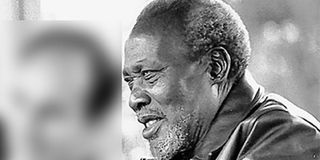When they were kings: How Kiambu’s power men ruled

Photo/FILE
The late Jomo Kenyatta.
When Kenya gained its independence with Jomo Kenyatta as its first leader, he assembled a group of Kiambu men, mostly relatives, who ruled the country with an iron fist.
With the President, the Attorney General, the Foreign minister, Defence minister, a minister of State, and the Commissioner of Police all from Kiambu, the levers of power were held securely in that area.
Gatundu, Kenyatta’s home village, became the power base where delegations from all over the country went to pledge their loyalty and donate to Mzee’s favourite charity courses — a local self-help hospital and Mama Ngina Children’s Home in Nairobi’s South C.
Mr James Gichuru used to sum up Kiambu thus:
“It is not by accident that Kiambu was made the seat of power, it is not that they like it, it is because the god of the Kikuyu decided that Kiambu would be the head, Murang’a the stomach and Nyeri the legs.”
Mr Gichuru, from Limuru, was Kenya’s first Defence minister and among a cabal of power barons who became known as the Kiambu Mafia.
In Africa, Kenyatta played in Africa’s premier league of those who fought for freedom. They included Egypt’s Abdel Nasser, Ethiopia’s Emperor Haille Selassie, Ghana’s Kwameh Nkrumah and Tanzania’s Mwalimu Julius Nyerere.
Together, they formed a de facto collegiate presidency that founded the Organisation of African Union, precursor of the African Union.
But it was in his Kiambu home that Kenya felt his real power.
“It (Kiambu) held these twin roles then but that has now disappeared and has been transformed into an economic power,” commented Mr Paul Muite, the leader of Safina and former Kikuyu MP.
“We in Kiambu need to live up to this reality and take our new role as the country’s economic hub,” he added.
Starting with an 18-member Cabinet, five were from Kiambu – Kenyatta, Gichuru, Mbiyu Koinange, Njoroge Mungai and Charles Njonjo.
Mr Njonjo was perhaps Kenya’s most powerful AG ever. Dr Mungai as Foreign minister appeared eager to exceed his powers.
At one time, President Kenyatta had to reprimand him for announcing to the media that he was the leader of the Kenyan delegation to a Commonwealth meeting which was actually led by the then Vice-President Daniel arap Moi.
Then, there were Bernard Hinga, the Commissioner of Police, Dr Josephat Karanja, first sent to the Court of St James, London as High Commissioner then Vice-Chancellor at University of Nairobi.
In London he was replaced by Ng’ethe Njoroge, a brother of Dr Mungai. Even the head of the elite presidential guard, Mr Bernard Njinu, came from Gatundu.
The Koinange family got it all… a minister, a Provincial Commissioner (Charles Karuga Koinange) and the headship of Kenyatta University College, Joseph Koinange.
Mr Stanley Munga Githunguri, the MP for Kiambaa, was made chief executive of the state owned National Bank of Kenya.
Today, Kiambu is no more a political power base, but an economic hub. Attempts by Deputy Prime Minister Uhuru Kenyatta, Mzee Kenyatta’s son, to return power to Kiambu have remained elusive.
A shot at the Presidency in the 2002 General Election failed and his current efforts remain clouded as long as the case at the International Criminal Court at the Hague relating to post-election violence remains unresolved.




